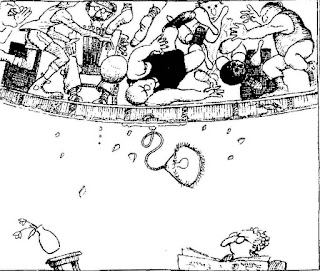THE TABLE AND THE CHAIR
I
Said the
Table to the Chair,
'You can
hardly be aware,
'How I
suffer from the heat,
'And from
chilblains on my feet!
'If we took
a little walk,
'We might
have a little talk!
'Pray let us
take the air!'
Said the
Table to the Chair.
II
Said the
Chair unto the Table,
'Now you
know we are not able!
'How
foolishly you talk,
'When you
know we cannot walk!'
Said the
Table, with a sigh,
'It can do
no harm to try,
'I've as
many legs as you,
'Why can't
we walk on two?'
III
So they both
went slowly down,
And walked
about the town
With a
cheerful bumpy sound,
As they
toddled round and round.
And
everybody cried,
As they
hastened to their side,
'See! the
Table and the Chair
'Have come out
to take the air!'
IV
But in going
down an alley,
To a castle
in a valley,
They
completely lost their way,
And wandered
all the day,
Till, to see
them safely back,
They paid a
Ducky-quack,
And a
Beetle, and a Mouse,
Who took
them to their house.
V
Then they
whispered to each other,
'O
delightful little brother!
'What a
lovely walk we've taken!
'Let us dine
on Beans and Bacon!'
So the
Ducky, and the leetle
Browny-Mousy
and the Beetle
Dined, and
danced upon their heads
Till they toddled to their beds.
BIODATA
·
Edward Lear, born on May 12
1812 and died on January 29 1888.
·
Lear was born in Holloway,
United Kingdom and died in Sanremo, Italy.
·
He is an English artist,
illustrator, musician, author and poet, now known mostly for his literary
nonsense in poetry and prouse and especially his limericks, a form he popularized.
LITERARY DEVICES
·
Assonance
i)
Stanza 1, line 7: “Pray let us take
the air!”
ii)
Stanza 2, line 7: “I’ve as many legs as you,”
iii)
Stanza 3, line 1: “So they both went slowly down,”
iv)
Stanza 4, line 8: “Who took them to their house.”
v) Stanza
5, line 1: “Then they whispered to each other,”
·
Alliteration
i)
Stanza 1, line 6: “We might have a
little talk”
ii)
Stanza 2, line 2: “Now you know we are not able!”
iii)
Stanza 3, line 6: “As they hastened to their side,”
iv)
Stanza 4, line 6: “The paid a Ducky-quack,”
v)
Stanza 5, line 7: “Dined, and danced upon their heads”
·
Personification:
The whole poem describes about non-living things
with human qualities.
·
Onomatopoeia
i)
Stanza 3, line 3: “With a cheerful bumpy
sound,”
ii)
Stanza 5, line 1: “Then they whispered
to each other,”
·
Repetition
i)
Chair
Stanza 1, line 1: Said the Table to the Chair
Stanza 1, line 8: Said the Table to the Chair
Stanza 2, line 1: Said the Chair unto the Table
Stanza 3, line 7: ‘See! The Table and the Chair
ii) Table
Stanza 1, line 1: Said the Table to the Chair
Stanza 1, line 8: Said the Table to the Chair
Stanza 2, line 1: Said the Chair onto the Table
Stanza 2, line 5: Said the Table, with a sigh,
Stanza 3, line 7: ‘See! the Table and the Chair
WHAT DOES HUMOR GOT TO DO WITH IT
It is a humorous poem because we literally know that table and the chair
are non-living things. This means that they could not do what humans do such as
walking, talking and dancing. Same goes with feelings, they would not be able
to feel happy or sad. In this poem, the poet told that the Table and the Chair are
walking and roaming around the alley joyfully. Not long after that, they got
lost and met with Ducky-quack, a Beetle and a Mouse. The creatures brought them
home. After that, they ate together and they danced upon their heads. Lastly, they
all went to bed.
MEANING OF THE POEM
The Table and The chair, is a funny verse poem by Edward Lear about the
relationship between the Table and the Chair. As with many of Lear’s poems the
story is of a couple who run away together. The Table and the chair don’t roam
quite as far as The Owl and the Pussy Cat or The Duck and the Kangaroo (some of
his other poems), but they do draw surprise from onlookers as they explore the
the valley and the street.
MESSAGE
This poem tells about the feeling when we found out something new in ourselves. However, there is a saying “too much happiness can make you less safe”. We should not be overjoyed for our specialties as being excessively happy has its own consequences such as engaging in riskier behaviours and tend to disregard threats, including binge eating, drug abuse etc.




Comments
Post a Comment